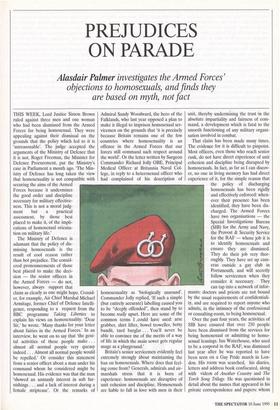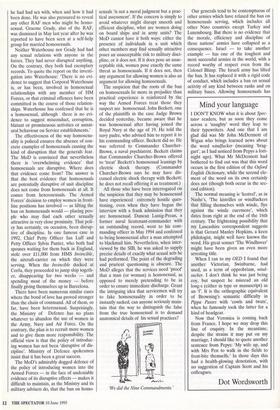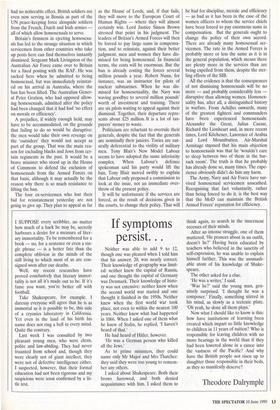PREJUDICES ON PARADE
Alasdair Palmer investigates the Armed Forces'
objections to homosexuals, and finds they are based on myth, not fact
THIS WEEK, Lord Justice Simon Brown ruled against three men and one woman who had been dismissed from the Armed Forces for being homosexual. They were appealing against their dismissal on the grounds that the policy which led to it is 'unreasonable'. The judge accepted the arguments of the Ministry of Defence.that it is not. Roger Freeman, the Minister for Defence Procurement, put the Ministry's case in Parliament a month ago. 'The Min- istry of Defence has long taken the view that homosexuality is not compatible with securing the aims of the Armed Forces because it undermines the good order and discipline necessary for military effective- ness. This is not a moral judg- ment but a practical assessment, by those best placed to make it, of the impli- cations of homosexual orienta- tion on military life.'
The Ministry of Defence is adamant that the policy of dis- missing homosexuals is the result of cool reason rather than hot prejudice. The consid- ered pronouncements of those best placed to make the deci- sion — the senior officers in the Armed Forces — do not, however, always support that claim as clearly as one might hope. Consid- er, for example, Air Chief Marshal Michael Armitage, former Chief of Defence Intelli- gence, responding to a request from the BBC programme Taking Liberties to explain his views on homosexuality: 'Dear Sir,' he wrote. 'Many thanks for your letter about fairies in the Armed Forces.' In an interview, he went on to say that 'the geni- tal activities of these people make . . . almost all normal people very queasy indeed. . . Almost all normal people would be repelled.' Or consider this statement from a senior officer about a man under his command whom he considered might be homosexual. His evidence was that the man 'showed an unmanly interest in soft fur- nishings. . . and a lack of interest during a female striptease'. Or the remarks of Admiral Sandy Woodward, the hero of the Falklands, who last year opposed a plan to make it illegal to imprison homosexual ser- vicemen on the grounds that 'it is precisely because Britain remains one of the few • countries where homosexuality is an offence in the Armed Forces that our forces still command such respect around the world'. Or the letter written by Surgeon Commander Richard Jolly OBE, Principal Medical Officer at Britannia Naval Col- lege, in reply to a heterosexual officer who had complained of his description of homosexuality as 'biologically unsound'. Commander Jolly replied, 'If such a simple (but entirely accurate) labelling caused you to be "deeply offended", then stand by to become really upset. Here are some of the common terms I .could have used: arse grabber, shirt lifter, bowel troweller, bony bandit, turd burglar . . . You'll never be able to convince me of the merits of a way of life in which the main sewer gets regular usage as a playground.'
Britain's senior servicemen evidently feel extremely strongly about maintaining the ban on homosexuals. Where does that feel- ing come from? Generals, admirals and air- marshals stress that it is born of experience: homosexuals are disruptive of unit cohesion and discipline. Homosexuals are liable to fall in love with men in their unit, thereby undermining the trust in the absolute impartiality and fairness of com- mand, a development which is fatal to the smooth functioning of any military organi- sation involved in combat.
That claim has been made many times. The evidenpe for it is difficult to pinpoint. Most officers, even those who reach senior rank, do not have direct experience of unit cohesion and discipline being disrupted by homosexuals. In fact, as far as I can discov- er, no one in living memory has had direct experience of it, for the simple reason that the policy of discharging homosexuals has been rigidly and effectively enforced: when- ever their presence has been identified, they have been dis- charged. The Armed Forces have two organisations — the Special Investigations Bureau (SIB) for the Army and Navy, the Provost & Security Service for the RAF — whose job it is to identify homosexuals and ensure they are dismissed. They do their job very thor- oughly. They have set up cam- eras outside a gay club in Portsmouth, and will secretly follow servicemen when they consider it necessary. They can tap into a network of infor- mants: doctors and priests are not bound by the usual requirements of confidentiali- ty, and are required to report anyone who admits, in the intimacy of the confessional or consulting-room, to being homosexual.
Over the past four years, the activities of SIB have ensured that over 250 people have been .dismissed from the services for being homosexual or admitting to homo- sexual leanings. Ian Waterhouse, who used to be a corporal in the RAF, was dismissed last year after he was reported to have been seen on a Gay Pride march in Lon- don. His room was searched, his diaries, letters and address book confiscated, along with videos of Another Country and The Torch Song Trilogy. He was questioned in detail about the names that appeared in his private correspondence and papers: whom he had had sex with, when and how it had been done. He was also pressured to reveal any other RAF men who might be homo- sexual. Graeme Grady, also of the RAF, was dismissed in May last year after he was reported to have been seen at a self-help group for married homosexuals.
Neither Waterhouse nor Grady had had any sexual relations with anyone in the forces. They had never disrupted anything. On the contrary, they both had exemplary records. To quote the report on the investi- gation into Waterhouse: 'There is no evi- dence to suggest that Corporal Waterhouse is, or has been, involved in homosexual relationships with any member of HM Forces, or that criminal offences have been committed in the course of those relation- ships. Waterhouse has confessed that he is a homosexual, although there is no evi- dence to suggest misconduct, corruption, blatant or promiscuous activities or unnat- ural behaviour on Service establishments.'
The effectiveness of the way homosexu- ality is policed ensures the absence of con- crete examples of homosexuals causing the kind of disruption that the generals fear. The MoD is convinced that nevertheless there is 'overwhelming evidence' that homosexuals are disruptive. Where does that evidence come from? The answer is that the best evidence that homosexuals are potentially disruptive of unit discipline does not come from homosexuals at all. It comes from heterosexuals. The Armed Forces' decision to employ women in front- line positions has involved — as lifting the ban on homosexuals would — placing peo- ple who may find each other sexually attractive in very close proximity. That poli- cy has certainly, on occasion, been disrup- tive of discipline. In one famous case in 1992, Chief Petty Officer Ian Luff and Petty Officer Sylvia Panter, who both had spouses waiting for them back in England, stole over £11,000 from HMS Invincible, the aircraft-carrier on which they were serving. When the Invincible docked at Corfu, they proceeded to jump ship togeth- er, disappearing for two weeks — and spending most of the money — before finally giving themselves up in Barcelona.
There have been numerous similar cases where the bond of love has proved stronger than the chain of command. All of them, so far, have been heterosexual. Surprisingly, the Ministry of Defence has no plans whatever to abandon the use of women in the Army, Navy and Air Force. On the contrary, the plan is to recruit more women and to give them more responsibility. The official view is that the policy of introduc- ing women has not been 'disruptive of dis- cipline'. Ministry of Defence spokesmen insist that it has been a great success.
The MoD's admirably dogged defence of the policy of introducing women into the Armed Forces — in the face of undeniable evidence of its disruptive effects — makes it difficult to maintain, as the Ministry and its military advisers do, that the ban on homo- sexuals 'is not a moral judgment but a prac- tical assessment'. If the concern is simply to avoid whatever might disrupt smooth and efficient discipline, what are women doing on board ships and in army units? The MoD cannot have it both ways: either the presence of individuals in a unit which other members may find sexually attractive poses an unacceptable risk to military disci- pline, or it does not. If it does pose an unac- ceptable risk, women pose exactly the same threat as homosexuals. If it does not, then any argument for allowing women is also an argument for allowing homosexuals.
The suspicion that the roots of the ban on homosexuals lie more in prejudice than practical experience is reinforced by the way the Armed Forces treat those they suspect are homosexual. John Beckett, one of the plaintiffs in the case Judge Brown decided yesterday, became aware that he was homosexual after having joined the Royal Navy at the age of 19. He told the navy padre, who advised him to report it to his commanding officer. Beckett did so. He was referred to Commander Churcher- Brown, a naval psychiatrist. Beckett claims that Commander Churcher-Brown offered to 'treat' Beckett's homosexual leanings by electric shock therapy. (Commander Churcher-Brown says he may have dis- cussed electric shock therapy with Beckett; he does not recall offering it as treatment.) All those who have been interrogated on the suspicion that they may be homosexual have experienced extremely hostile ques- tioning, even when they have begun the interview with a frank admission that they are homosexual. Duncan Lustig-Prean, a former naval lieutenant-commander with an outstanding record, went to his com- manding officer in May 1994 and confessed to being homosexual after a man attempted to blackmail him. Nevertheless, when inter- viewed by the SIB, he was asked to supply precise details of exactly what sexual acts he had performed. The point of the degrading and prurient questioning is obscure. The MoD alleges that the services need 'proof' that a man (or woman) is homosexual, as opposed to merely pretending to be in order to ensure immediate discharge. Grant the intriguing idea that servicemen will try to fake homosexuality in order to be instantly sacked, can anyone seriously main- tain that the way to distinguish the false from the true homosexual is to demand anatomical details of his sexual practices?
'We did the Nine Commandments.' Our generals tend to be contemptuous of other armies which have relaxed the ban on homosexuals serving, which includes all other Nato countries except Turkey and Luxembourg. But there is no evidence that the morale, efficiency and discipline of those nations' armies have collapsed as a consequence. Israel — to take another example — has one of the toughest and most successful armies in the world, with a record worthy of respect even from the Colonel Blimp. The Israeli army has lifted the ban. It has replaced it with a rigid code of conduct, which includes a ban on sexual activity of any kind between ranks and on military bases. Allowing homosexuals has had no noticeable effect. British soldiers are even now serving in Bosnia as part of the UN peace-keeping force alongside soldiers from the French, Dutch and Irish armies — all of which allow homosexuals to serve.
Britain's firmness in ejecting homosexu- als has led to the strange situation in which servicemen from other countries who take up posts here can find themselves instantly dismissed. Sergeant Mark Livingston of the Australian Air Force came over to Britain for a fixed posting with the RAF. He was sacked here when he admitted to being homosexual, but was immediately reinstat- ed on his arrival in Australia, where the ban has been lifted. The Australian Gener- al Peter Gration, who had opposed allow- ing homosexuals, admitted after the policy had been changed that it had had `no effect on morale or efficiency'.
A prejudice, if widely enough held, may have to be accommodated, on the grounds that failing to do so would be disruptive: the men would take their own revenge on the 'outsiders' they would not accept as part of the group. That was the main rea- son for excluding blacks and Jews from cer- tain regiments in the past. It would be a brave minister who stood up in the House of Commons to defend the exclusion of homosexuals from the Armed Forces on that basis, although it may actually be the reason why there is so much resistance to lifting the ban.
The four ex-servicemen who lost their bid for reinstatement yesterday are not going to give up. They plan to appeal as far as the House of Lords, and, if that fails, they will move to the European Court of Human Rights — where they will almost certainly win. Lord Justice Simon Brown stressed that point in his judgment. The leaders of Britain's Armed Forces will then be forced to pay large sums in compensa- tion, and to reinstate, against their better judgment, men and women they have dis- missed for being homosexual. In financial terms, the costs will be enormous. But the ban is already costing the forces several million pounds a year. Robert Nunn, for instance, was an instructor for pilots of nuclear submarines. When he was dis- missed for homosexuality, the Navy was waving goodbye to several million pounds' worth of investment and training. There are six pilots waiting to appeal against their dismissal. Together, their departure repre- sents about £25 million. It is a lot of tax- payers' money to waste.
Politicians are reluctant to overrule their generals, despite the fact that the generals are nominally their juniors. Tories are nat- urally deferential to the virility of military men. Tony Blair's New Model Labour seems to have adopted the same inferiority complex. When Labour's defence spokesman said his party would lift the ban, Tony Blair moved swiftly to explain that Labour only proposed a commission to look at the issue, not an immediate over- throw of the present policy.
It will be unfortunate if the services are forced, as the result of decisions given in the courts, to change their policy. That will be bad for discipline, morale and efficiency — as bad as it has been in the case of the women officers to whom the service chiefs have been forced to pay enormous sums in compensation. But the generals ought to change the policy of their own accord. There are already many homosexual ser- vicemen. The rate in the Armed Forces is probably more or less the same as it is in the general population, which means there are plenty more in the services than are being expelled from them, despite the ster- ling efforts of the SIB.
All the evidence is that the consequences of not dismissing homosexuals will be no more — and probably considerably less — disruptive than allowing women. Homosex- uality has, after all, a distinguished history in warfare. From Achilles onwards, many of the greatest fighters and commanders have been experienced homosexuals: Alexander the Great, Julius Caesar, Richard the Lionheart and, in more recent times, Lord Kitchener, Lawrence of Arabia and Lord Mountbatten. Air-Marshal Armitage stressed that his main objection to homosexuals was that he 'wouldn't care to sleep between two of them in the bar- rack room'. The truth is that he probably has already done so, many times. The expe- rience obviously didn't do him any harm.
The Army, Navy and Air Force have sur- vived homosexual servicemen unscathed. Recognising that fact voluntarily, rather than being forced to do it, is the best way that the MoD can maintain the British Armed Forces' reputation for efficiency.




































































 Previous page
Previous page